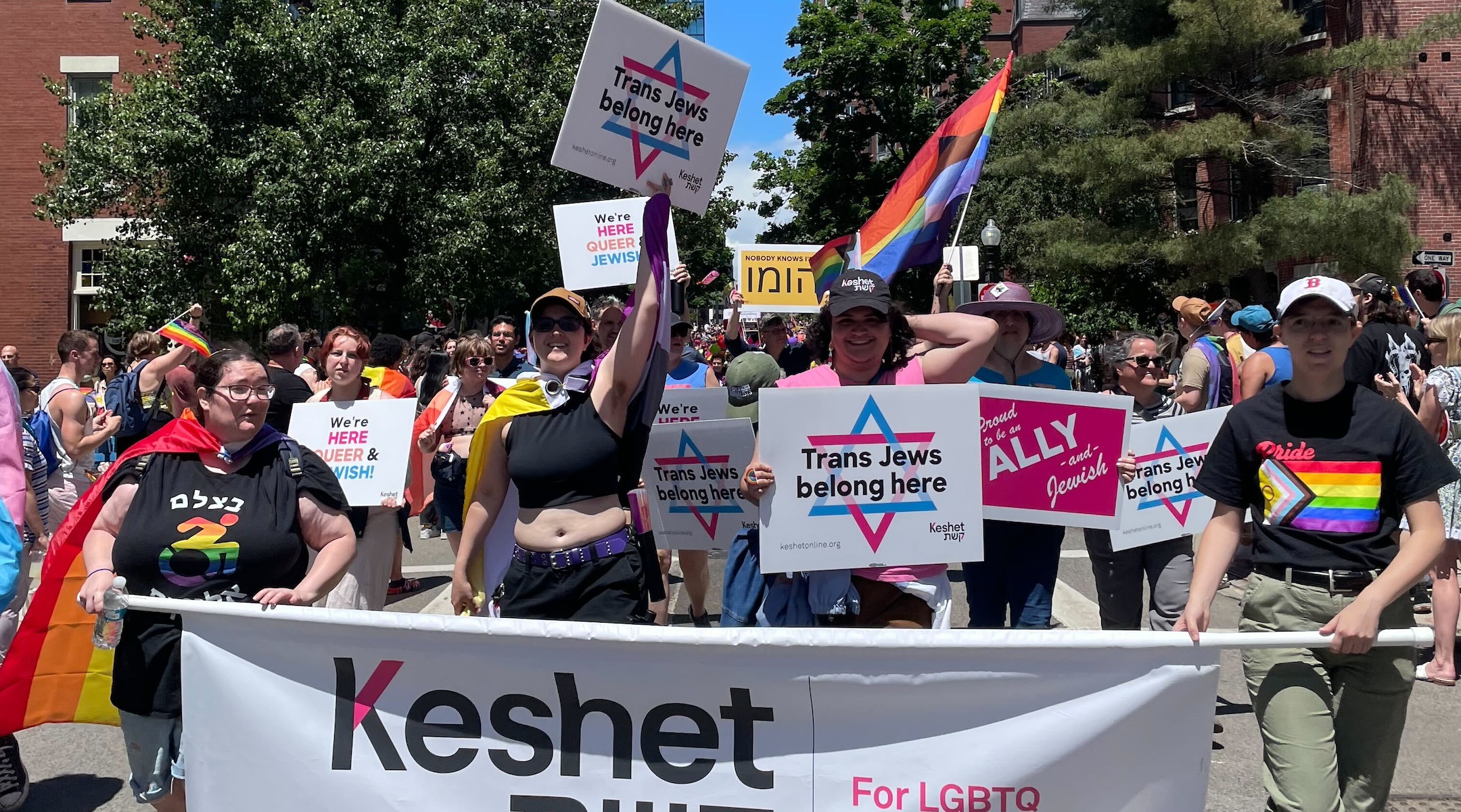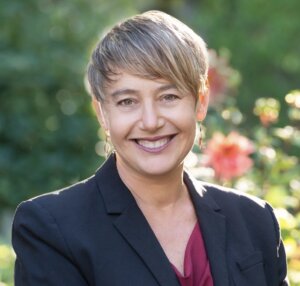Made to feel unwelcome at Pride, LGBTQ Jews will not cede joy
Litmus tests on Israel shouldn’t shake the determination of queer Jews, writes the CEO of Keshet

A Keshet contingent marches in the Pride celebration in Boston, June 14, 2024. (Courtesy Keshet)
(JTA) — It’s been 30 years since I feared that my gay identity might threaten my sense of belonging in the Jewish community.
I was in college. I walked into Shabbat dinner holding my girlfriend’s hand. Tightly. We were the only openly queer people in the room, and I felt all eyes on us. I wasn’t sure if my Jewish community would accept me, but I wanted to live in a world where I and other queer Jews could be our full selves. I became an activist and a bridge builder, bringing together queer and Jewish communities, planting the seeds for the work I do today.
This year, that fear and vulnerability I knew in college has crept back for the first time since 1993. In the wake of Oct. 7, I have feared not belonging in LGBTQ+ spaces as a Jew.
I hear this fear echoed among my LGBTQ+ Jewish colleagues and friends. Friends who have marched every year for the last 40 years will not come to Pride events this year because they don’t know if they will be safe from verbal harassment or even physical violence. Some LGBTQ+ Jews worry about stepping into queer spaces where there will be litmus tests on their views on Israel and Palestine. Some LGBTQ+ Jews are angry that their non-Jewish counterparts have abandoned them. These worries and fears tempt us to hide parts of ourselves or to withdraw from longtime communities.
In Keshet’s work mobilizing Jews to fight for LGBTQ+ equality, we work in partnership with many secular LGBTQ+ rights organizations. A few months ago, one of our partners issued a statement about Israel and Gaza that we at Keshet found deeply troubling. In my heart, part of me wanted to distance myself and not engage at all. But as I know from over two decades of this work, when we reach out, we often discover that we are not alone and new understandings can emerge. Partnership in the midst of tension can be painful, but it is the only way to potentially bridge divisions. If we are committed to LGBTQ+ and Jewish liberation, we cannot abandon one another. Too much is on the line.
I took a deep breath and reached out to the CEO. I shared with her what I and many Jews found hurtful and polarizing about the statement. I also talked about what was painful for me, personally, as an Israeli-American who has long worked for Israeli-Palestinian peace. Authentically leaning into the relationship and entering into a vulnerable conversation made all the difference. The leader assured me that the most problematic aspects of the statement would not be shared again by her organization.
What I have learned from queer history, what I have learned from Jewish history, and what I have learned from my own experience as an LGBTQ+ Jewish community leader, is that we cannot let fear, grief, hurt, or anger stop us. In fact, to the contrary: We must engage all parts of ourselves and we must turn toward each other — even when it might feel hard, perhaps especially when it is hard. How else can we move forward with greater strength?
For many Jews, the challenges and uncertainties of celebrating Pride in 2024 are deep and real. The ruptures between and within certain communities might feel irreparable. But I know deep in my bones that LGBTQ+ Jews have an unshakeable spirit and clarity about the power of being fully ourselves. Our resilience in the face of fear and uncertainty, and our clear-eyed commitment to what it takes to make change, will guide us to a better time and help us shape a more just world. The way through this moment can be found in what Pride offers us and demands of us: Protest. Community. Joy.
This month and onward, my deepest hope for our communities is that we do not cede joy. We do not cede wholeness. We do not cede Pride. That we will take to the streets. We will march. We will dance. We will protest. We will have hard conversations. We will stay in relationship. We will move what feels immovable. As for me, I will celebrate this Pride as I have in the past, as an out, proud queer Jew. I will wear my Star of David. I will hold my wife’s hand. See you there.
The views and opinions expressed in this article are those of the author and do not necessarily reflect the views of JTA or its parent company, 70 Faces Media.
A message from our Publisher & CEO Rachel Fishman Feddersen

I hope you appreciated this article. Before you go, I’d like to ask you to please support the Forward’s award-winning, nonprofit journalism so that we can be prepared for whatever news 2025 brings.
At a time when other newsrooms are closing or cutting back, the Forward has removed its paywall and invested additional resources to report on the ground from Israel and around the U.S. on the impact of the war, rising antisemitism and polarized discourse.
Readers like you make it all possible. Support our work by becoming a Forward Member and connect with our journalism and your community.
— Rachel Fishman Feddersen, Publisher and CEO























